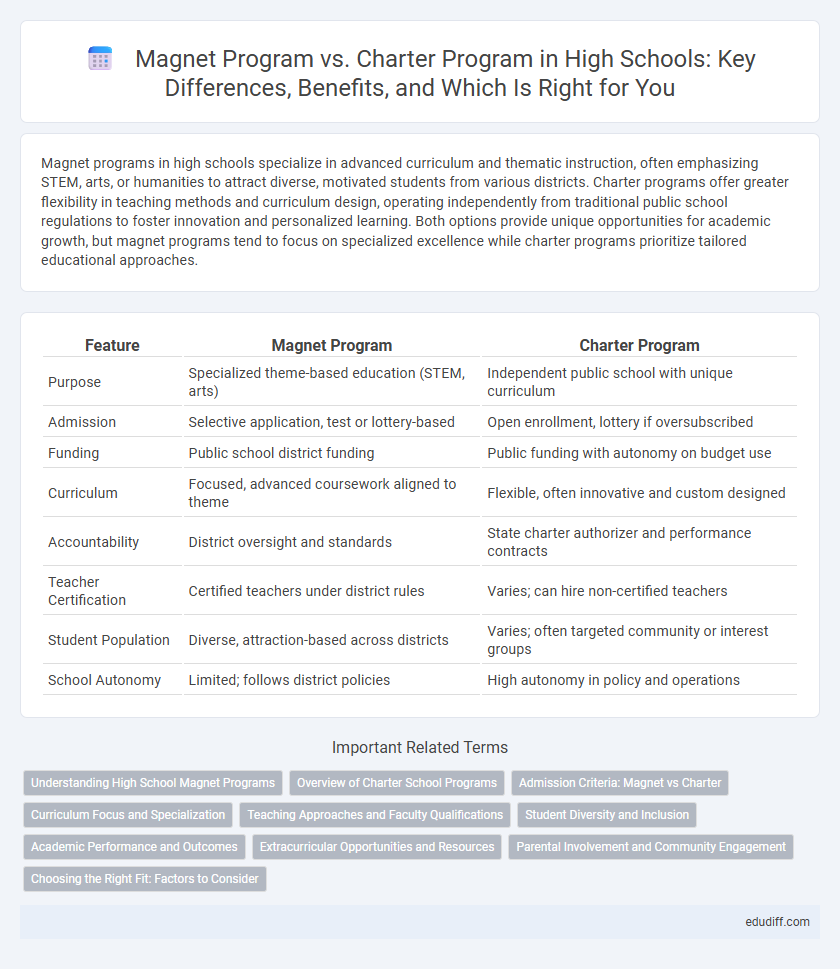Magnet programs in high schools specialize in advanced curriculum and thematic instruction, often emphasizing STEM, arts, or humanities to attract diverse, motivated students from various districts. Charter programs offer greater flexibility in teaching methods and curriculum design, operating independently from traditional public school regulations to foster innovation and personalized learning. Both options provide unique opportunities for academic growth, but magnet programs tend to focus on specialized excellence while charter programs prioritize tailored educational approaches.
Table of Comparison
| Feature | Magnet Program | Charter Program |
|---|---|---|
| Purpose | Specialized theme-based education (STEM, arts) | Independent public school with unique curriculum |
| Admission | Selective application, test or lottery-based | Open enrollment, lottery if oversubscribed |
| Funding | Public school district funding | Public funding with autonomy on budget use |
| Curriculum | Focused, advanced coursework aligned to theme | Flexible, often innovative and custom designed |
| Accountability | District oversight and standards | State charter authorizer and performance contracts |
| Teacher Certification | Certified teachers under district rules | Varies; can hire non-certified teachers |
| Student Population | Diverse, attraction-based across districts | Varies; often targeted community or interest groups |
| School Autonomy | Limited; follows district policies | High autonomy in policy and operations |
Understanding High School Magnet Programs
High school Magnet Programs offer specialized curricula designed to attract students with specific interests in areas like STEM, the arts, or humanities, providing advanced learning opportunities and often requiring an application process. These programs emphasize academic rigor and enrichment beyond the traditional high school experience, fostering a diverse environment where motivated students can excel. Understanding the structure and benefits of Magnet Programs helps families make informed decisions about educational pathways that align with a student's talents and goals.
Overview of Charter School Programs
Charter school programs in high schools offer specialized curricula designed to promote academic excellence and innovation, often with greater autonomy compared to traditional public schools. These programs emphasize personalized learning, community involvement, and accountability through performance-based assessments. Typically funded by public resources but independently operated, charter schools provide diverse educational approaches tailored to meet specific student needs and interests.
Admission Criteria: Magnet vs Charter
Magnet programs typically require a competitive application process emphasizing academic achievement, standardized test scores, and teacher recommendations, targeting students with strong academic records and specific talents. Charter programs often utilize a lottery system or open enrollment policies, focusing less on academic performance and more on providing access and choice to diverse student populations. Admission criteria for magnet schools are designed to select high-performing students, whereas charter schools aim to serve a broader range of learners.
Curriculum Focus and Specialization
Magnet programs emphasize specialized curriculums tailored to arts, science, or technology, promoting advanced study and skill development in specific fields. Charter programs offer more flexibility in curriculum design, often blending traditional subjects with innovative or project-based learning approaches to foster creativity and critical thinking. Students in magnet programs typically follow rigorous pathways aligned with their specialization, while charter programs encourage broader exploration within customized educational frameworks.
Teaching Approaches and Faculty Qualifications
Magnet Programs emphasize specialized curricula often taught by teachers with advanced degrees and subject-specific certifications, fostering in-depth expertise and innovative teaching methods. Charter Programs prioritize flexible, student-centered pedagogy with faculty selected for adaptability and diverse instructional skills, allowing tailored learning experiences. Both program types maintain rigorous faculty qualifications but differ in pedagogical focus and instructional strategies to meet varied educational goals.
Student Diversity and Inclusion
Magnet programs emphasize specialized curricula designed to attract a diverse student body from various districts, promoting racial, socioeconomic, and cultural inclusion through targeted recruitment and admissions. Charter programs operate independently from traditional public school regulations, often offering innovative teaching methods but vary widely in diversity outcomes depending on their location and enrollment policies. Both programs strive to foster inclusive environments, yet magnet schools typically report higher success in maintaining balanced representation across different demographic groups.
Academic Performance and Outcomes
Magnet programs often emphasize specialized curricula in STEM, arts, or humanities, resulting in higher standardized test scores and college acceptance rates compared to general education. Charter programs provide flexible learning environments that can tailor teaching methods to student needs, frequently improving graduation rates and student engagement. Both programs tend to outperform traditional public schools in academic achievement and post-secondary success metrics.
Extracurricular Opportunities and Resources
Magnet programs offer a wide range of specialized extracurricular opportunities, such as advanced STEM clubs, performing arts ensembles, and international language societies, supported by dedicated funding and access to expert instructors. Charter programs provide flexible, community-driven extracurricular activities tailored to student interests but may face limitations in resources and facilities compared to magnet schools. Access to state-of-the-art labs, competitive teams, and enrichment workshops is often more extensive in magnet programs, enhancing students' academic and social development.
Parental Involvement and Community Engagement
Magnet programs often emphasize parental involvement through specialized events and targeted communication strategies that foster strong collaboration between families and schools. Charter programs typically encourage community engagement by partnering with local organizations and businesses to support student learning and extracurricular activities. Both programs leverage parental and community participation to enhance educational outcomes and create supportive learning environments.
Choosing the Right Fit: Factors to Consider
Selecting the right high school program involves evaluating the curriculum focus, student support services, and admission criteria for both Magnet and Charter Programs. Magnet Programs often emphasize specialized subjects like STEM or arts with competitive entry requirements, while Charter Programs provide innovative, flexible learning environments with unique educational approaches. Assessing personal learning preferences, academic goals, and extracurricular opportunities helps determine the best fit for a student's success and engagement.
Magnet Program vs Charter Program Infographic

 edudiff.com
edudiff.com